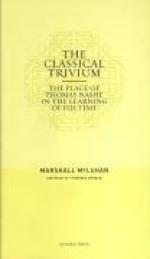|
This section contains 9,424 words (approx. 32 pages at 300 words per page) |

|
SOURCE: Crewe, Jonathan V. “The Loss of Decorum.” In Unredeemed Rhetoric: Thomas Nashe and the Scandal of Authorship, pp. 21-44. Baltimore: Johns Hopkins University Press, 1982.
In the essay below, Crewe contrasts Nashe's theatrical rhetoric with Puritan rhetorical standards, arguing that the language of excess in Nashe is an effective rhetorical strategy and not merely a lack of self-control. The critic primarily focuses on Nashe's earlier works, noting that in later works the author attempted to redeem his rhetoric from the dangers of theatrical duplicity or manipulation.
The critics whose work I surveyed in the previous chapter are linked in a common effort to produce what is by implication lacking in the literature of the English Renaissance, namely a language of final order and ultimate significance. It goes almost without saying that their effort parallels and repeats that of authors within the period, especially Puritan ones. The existence of...
|
This section contains 9,424 words (approx. 32 pages at 300 words per page) |

|


